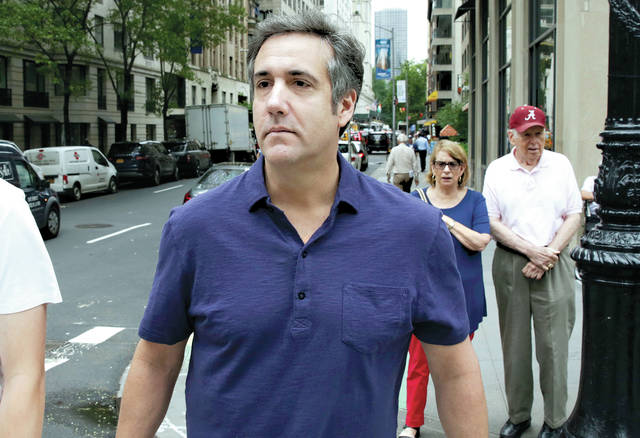NEW YORK — Michael Cohen, President Donald Trump’s former personal lawyer, could be charged before the end of the month with bank fraud in his dealings with the taxi industry and with committing other financial crimes, two people familiar with the federal probe said Monday.
The people confirmed reports that federal prosecutors in Manhattan were considering charging Cohen after months of speculation over a case that has been a distraction for the White House with the midterm elections approaching.
The New York Times reported Sunday, based on anonymous sources, that prosecutors have been focusing on more than $20 million in loans obtained by taxi businesses that Cohen and his family own.
As part of the investigation, prosecutors have subpoenaed records from Sterling National Bank, one of the institutions that loaned Cohen money with his ownership in taxi cabs as collateral, one of the people said. The material was sought because it’s suspected Cohen falsified some of the paperwork, the person said.
The people, who weren’t authorized to discuss the case and spoke on Monday on condition of anonymity, refused to answer questions about speculation that Cohen still might strike a plea deal with prosecutors requiring his cooperation.
Absent a quick resolution, it’s believed that prosecutors would put off a decision on how to go forward with the case until after the election in compliance with an informal Justice Department policy of avoiding bringing prosecutions that could be seen as political and influence voters.
Both the U.S. attorney’s office and an attorney for Cohen, Lanny Davis, declined to comment Monday. A spokesman for Sterling National Bank declined to comment.
Cohen had gained notoriety as Trump’s loyal “fixer” before FBI agents raided his officies and a hotel where he was staying while renovations were being done on his apartment in a Trump-developed building.
Prosecutors were initially silent about why Cohen was under investigation. Some details became public after lawyers for Cohen and Trump asked a judge to temporarily prevent investigators from viewing some of the seized material, on the grounds that it was protected by attorney-client privilege.
The search of Cohen’s files sought bank records, communications with the Trump campaign and information on hush money payments made in 2016 to two women: former Playboy model Karen McDougal, who received $150,000, and the porn actress Stormy Daniels, who got $130,000.
At the time, Trump branded the raid “a witch hunt,” an assault on attorney-client privilege and a politically motivated attack by enemies in the FBI.
The president’s initial support for Cohen degenerated over the summer into a public feud, prompting speculation that, to save himself, Cohen might be willing to tell prosecutors some of the secrets he’d help Trump keep.
Davis, Cohen’s lawyer, has been sending signals of his own.
First, he went on CNN with a tape of Trump talking about the McDougal payment. Then, over the weekend, he revealed that he’s been having conversations with John Dean, the White House lawyer who helped bring down President Richard Nixon.
Davis said Monday that he sees major parallels between Cohen and Dean and that he wanted to hear what he’d learned from Watergate and his perspective on what Cohen is going through. Cohen hasn’t spoken to Dean, Davis said.



